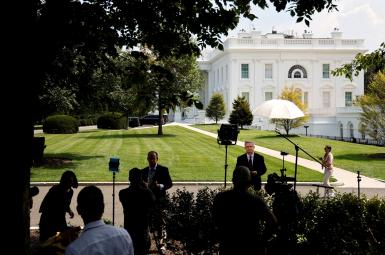
Iran Officials Sound Defiant As US Appoints Rob Malley
As President Joe Biden picks Robert Malley as his administration's representative for Iran, the Jewish Insider reported that "despite vocal support from parts of the Democratic Party, some senators appeared sceptical" about the choice.
Some media and officials in Iran have taken Malley’s appointment as a positive development, emphasizing his “expertise” in Iranian and regional issues and his desire to negotiate with countries such as Syria and Iran. But even though President Hassan Rouhani, his spokesperson Ali Rabiei and Foreign minister Javad Zarif at times show their eagerness to start negotiations, at times they repeat Supreme Leader Ali Khamenei's words that Iran does not need to negotiate with the United States.
Speaking in Istanbul on Friday Zarif reiterated that it is the United States that has to take the first step toward a rapprochement with Tehran, while other officials and military commanders sounded even more defiant. However, one political analyst in Tehran, Mehdi Motaharnia told Fararu that it would be a big blunder if Iran misses the chance to compromise with the Biden administration.
Several reports by IRGC-linked Tasnim news agency Quoted Friday Prayers Imams and members of Parliament from all over Iran warning state officials not to negotiate with the United States.
This might be a tactic by Tehran officials to try to put initial pressure on the Biden administration and see how lucky they can get, while in fact they are eager to open talks to have some of the sanctions lifted.
Malley’s appointment has so far been one of the most controversial decisions by the Biden team. According to the Jewish Insider, "a number of prominent progressive Democrats coalesced behind Malley, while Republicans and some moderate Democrats criticized him for his close relationships with Iranian leaders and for meeting with members of Hamas."
Earlier, Reuters quoted a senior State Department official as saying, "Secretary Blinken is building a dedicated team, drawing from clear-eyed experts with a diversity of views. Leading that team as our special envoy for Iran will be Rob Malley, who brings to the position a track record of success negotiating constraints on Iran’s nuclear program.”
The source added: “The secretary is confident he and his team will be able to do that once again.” Malley is currently the president and CEO of the International Crisis Group.
In his new role, "Malley will be responsible for trying to persuade Tehran to rein in its nuclear program — and stop enriching uranium beyond limits imposed by a 2015 deal with world powers — and agree to new negotiations before the United States lifts its bruising economic sanctions against Iran," wrote the New York Times on 28 January.
Meanwhile, Iran's Press TV characterized Malley as a "a top Iran adviser" to the Obama administration and said that "While some Republican lawmakers and pro-Israel groups expressed concern that he would be soft on Iran and tough on Israel, several foreign policy veterans supported his appointment."
Press TV, a source close to the core of the Iranian regime, opined that concerns about Malley's appointment are part of a broader effort against diplomacy with Iran and reversing former Republican President Donald Trump's aggressive approach towards Iran. Press TV concluded that "Swift lifting of Trump-era Iran sanctions would indicate Biden's commitment to restoring US credibility."
Press TV repeated the official line from Tehran that Biden won't have an everlasting chance to lift the sanctions and return to the nuclear deal, adding that Tehran is looking for "genuine actions not mere words" from Washington.
While Israel, Saudi Arabia and the United Arab Emirates are the most vocal critics of a soft US policy toward Iran, Saudi and UAE sources have still not been observed to react to Malley's appointment.
However, not all the news coming from the United States sound promising. US B-52 bombers flew over the Persian Gulf for the first time since Biden’s inauguration in an unmistakable show of force for Iran to consider.
The Pentagon's Press Secretary John Kirby said in a press conference January 28 that Washington will use its deterrence power to stop Iran's “destructive measures” in the region. He also stressed that Iran is continuing its support for terrorism all over the region.








